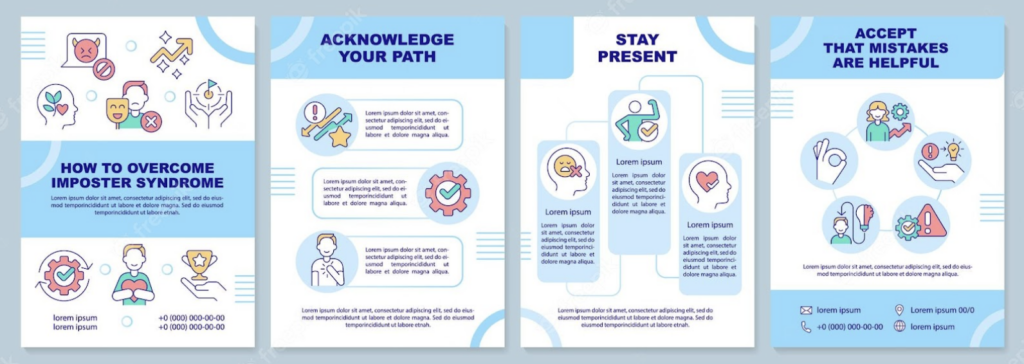
Proven Strategies for Success: How to Conquer Imposter Syndrome and Embrace Self-Confidence
Imposter syndrome, a term first coined in the late 1970s by psychologists Pauline Clance and Suzanne Imes, is a psychological phenomenon where individuals persistently doubt their achievements and fear being exposed as a fraud, despite clear evidence of their competence. This chronic self-doubt and sense of intellectual fraudulence may occur even in the face of continued success and accomplishments. It’s like a voice inside your head that constantly whispers, “You’re not good enough, they’re going to find out.”
Imposter syndrome is not an official psychiatric diagnosis, but it’s a very real and specific form of intellectual self-doubt that affects a large number of people. It transcends gender, age, profession, and personal accomplishments. It’s a common experience among high achievers, perfectionists, and those who are used to excelling.
Understanding the imposter syndrome meaning is the first step in combating it. Recognizing that these feelings of self-doubt and fear of being found out are not unique to you, but are shared by many, can be a powerful tool in overcoming them.

The Impact of Imposter Syndrome on Self-Confidence
Imposter syndrome can have a profound impact on self-confidence. It can foster a cycle of self-doubt, fear, and anxiety that can lead to avoidance of challenges, procrastination, and overworking—one’s self in an attempt to prove worthiness. It can also lead to burnout, stress, and reduced job satisfaction.
This cycle can be debilitating and can prevent an individual from reaching their full potential. They may shy away from opportunities for fear of being discovered as a fraud, or they may overwork themselves to the point of burnout in an attempt to prove their worth.
The impact of imposter syndrome on self-confidence is significant, but it’s not insurmountable. With the right strategies, it’s possible to overcome these self-defeating thoughts and patterns and build a healthy, robust self-confidence.
The Common Signs and Symptoms of Imposter Syndrome
Imposter syndrome can manifest in a variety of ways, but there are some common signs and symptoms. These may include a constant fear of being exposed as a fraud, a tendency to attribute successes to luck or external factors rather than personal ability, and a tendency to downplay achievements.
Other signs may include feelings of inadequacy despite evidence of success, a fear of failure, and an inability to take compliments or recognize one’s own achievements. It’s important to note that these feelings can occur even in the face of clear evidence of competence and success.
Recognizing these signs and symptoms is an important step in learning how to deal with imposter syndrome. They provide a roadmap to understanding the thoughts and behaviors that may be holding you back, and provide a starting point for creating strategies to overcome them.
Proven Strategies for Overcoming Imposter Syndrome
There are many proven strategies for overcoming imposter syndrome. One of the most effective is to challenge your inner critic. This involves recognizing the patterns of negative self-talk and challenging them with evidence of your competence and achievements.
Another effective strategy is to practice self-compassion. This involves treating yourself with the same kindness and understanding you would offer to a friend or loved one. Remember, everyone makes mistakes and has moments of doubt—it’s part of being human.
Surrounding yourself with supportive people who affirm your abilities and successes can also help to combat feelings of impostorism. Sharing your feelings with trusted friends, mentors, or a therapist can be incredibly helpful. They can provide perspective, reassurance, and strategies for coping.
Using Self-Confidence to Combat Imposter Syndrome
Self-confidence is a powerful tool in the fight against imposter syndrome. Cultivating a strong sense of self-worth and belief in your abilities can help to silence the inner critic that fuels feelings of impostorism.
Building self-confidence is a process that involves changing thought patterns, behaviors, and beliefs. It involves recognizing your strengths and achievements, challenging negative self-talk, and practicing self-compassion.
Remember, self-confidence isn’t about being perfect or knowing everything—it’s about trusting in your ability to learn and grow. It’s about accepting yourself, flaws and all, and recognizing that you are worthy and capable.
Resources for Dealing with Imposter Syndrome
There are many resources available for dealing with imposter syndrome. These include self-help books, online courses, workshops, and therapy. These imposter syndrome resources can be incredibly helpful in providing strategies, tools, and support for overcoming these feelings of self-doubt and fear.
How to Maintain Confidence After Defeating Imposter Syndrome
Overcoming imposter syndrome is a significant achievement, but maintaining confidence can be a challenge. It’s important to continue practicing the strategies that helped you overcome these feelings in the first place.
This includes continuing to challenge negative self-talk, practicing self-compassion, and celebrating your achievements. It also involves continuing to surround yourself with supportive people and utilizing resources as needed.
Remember, maintaining confidence is a journey, not a destination. There will be ups and downs, but with perseverance and self-care, you can continue to cultivate a robust, healthy self-confidence.
Additional Help: Imposter Syndrome Support and Resources
If you’re struggling with imposter syndrome, remember, you’re not alone. There are many support and resources available to help. These include therapists who specialize in this area, online support groups, and workshops.
Books and online courses can also be incredibly helpful. They provide strategies, insights, and tools to help you understand and overcome these feelings of self-doubt and fear.
If you’re ready to take the next step in overcoming imposter syndrome and embracing self-confidence, book a 10-minute complimentary intake call to see how we can help. Our team of professionals is here to provide support, guidance, and resources to help you on your journey.
The Journey from Imposter to Confident Achiever
Overcoming imposter syndrome and embracing self-confidence is a journey. It’s a process of understanding and challenging self-doubt, cultivating self-worth, and embracing your achievements. It’s about learning to trust in your abilities, celebrate your successes, and accept that you are worthy and capable.
The journey from imposter to confident achiever may be challenging, but it’s a journey worth taking. It’s a journey that will empower you to reach your full potential and embrace your success. So take that first step today. You are capable, you are deserving, and you are not an imposter.
Change Begins With A Call. Book now.
We make the therapy process a simple, welcoming experience.
After your first intake call, we’ll pair you with the perfect psychotherapist for your needs and continue to support you and your mental health every step of the way. Joy and abundance awaits.
Free 10-minute Consultation
We offer a free consultation prior to making an in-person appointment. Schedule online or call us today to get started.

